Ritz London and Consumer Behaviour: A Hospitality Analysis Report
VerifiedAdded on 2023/01/05
|11
|1183
|43
Report
AI Summary
This report delves into the intricacies of consumer behaviour within the hospitality industry, using Ritz London as a case study. It examines the cultural, social, personal, and psychological factors that influence consumer decisions. The report explores how these factors, including age, occupation, and motivation, shape consumer choices. Furthermore, it assesses the impact of digital technology on consumer behaviour, highlighting changes in consumer desires and connectivity. The conclusion emphasizes the importance of understanding consumer behaviour for organizational success, discussing B2C and B2B factors, and the consumer decision-making process, including market research approaches. The report suggests that appropriate decisions are necessary to achieve goals within a specific timeframe. The report provides a comprehensive overview of the factors affecting consumer behaviour in the hospitality sector, emphasizing the importance of understanding consumer trends and adapting to the evolving digital landscape.
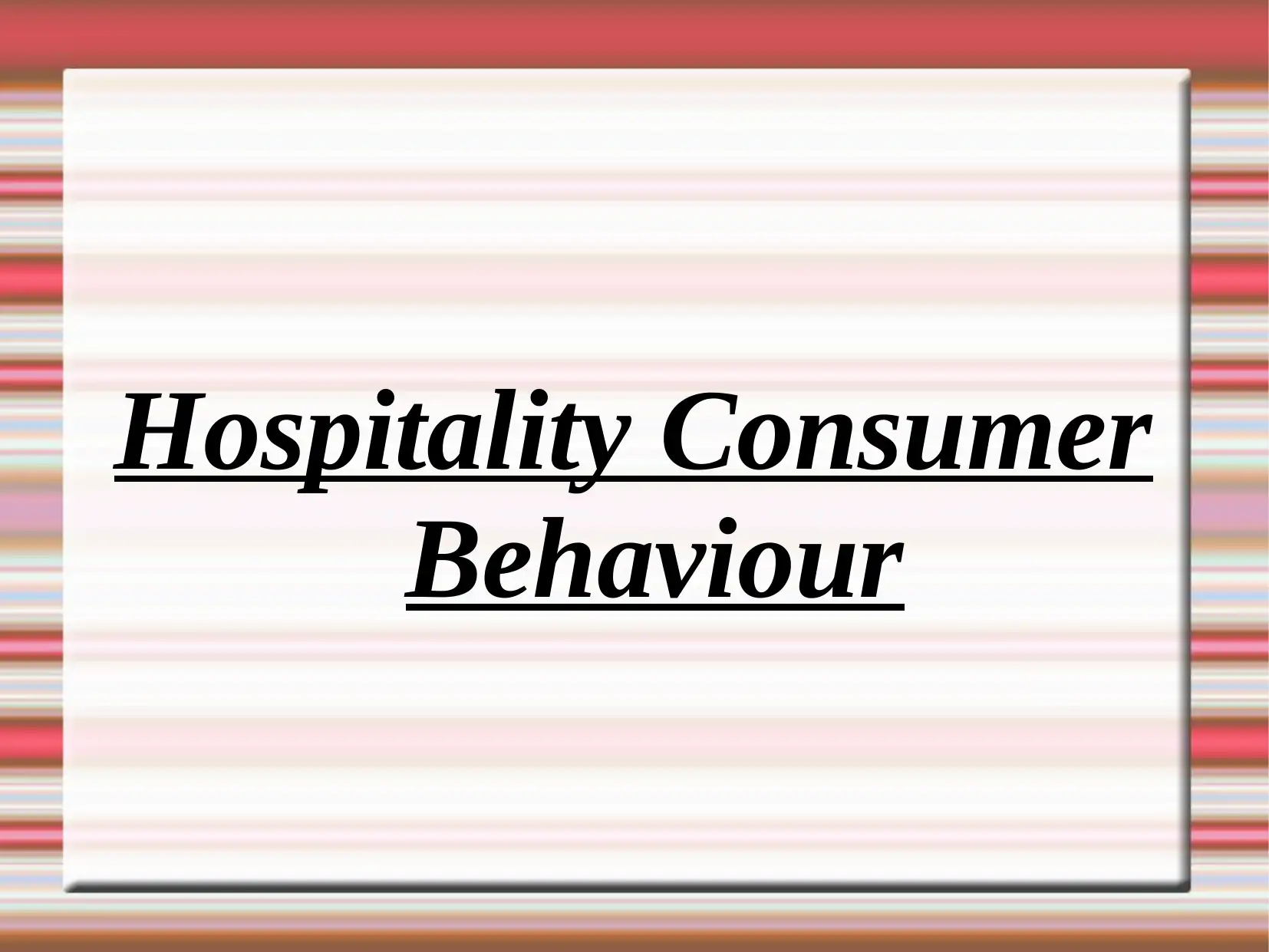
Hospitality Consumer
Behaviour
Behaviour
Paraphrase This Document
Need a fresh take? Get an instant paraphrase of this document with our AI Paraphraser
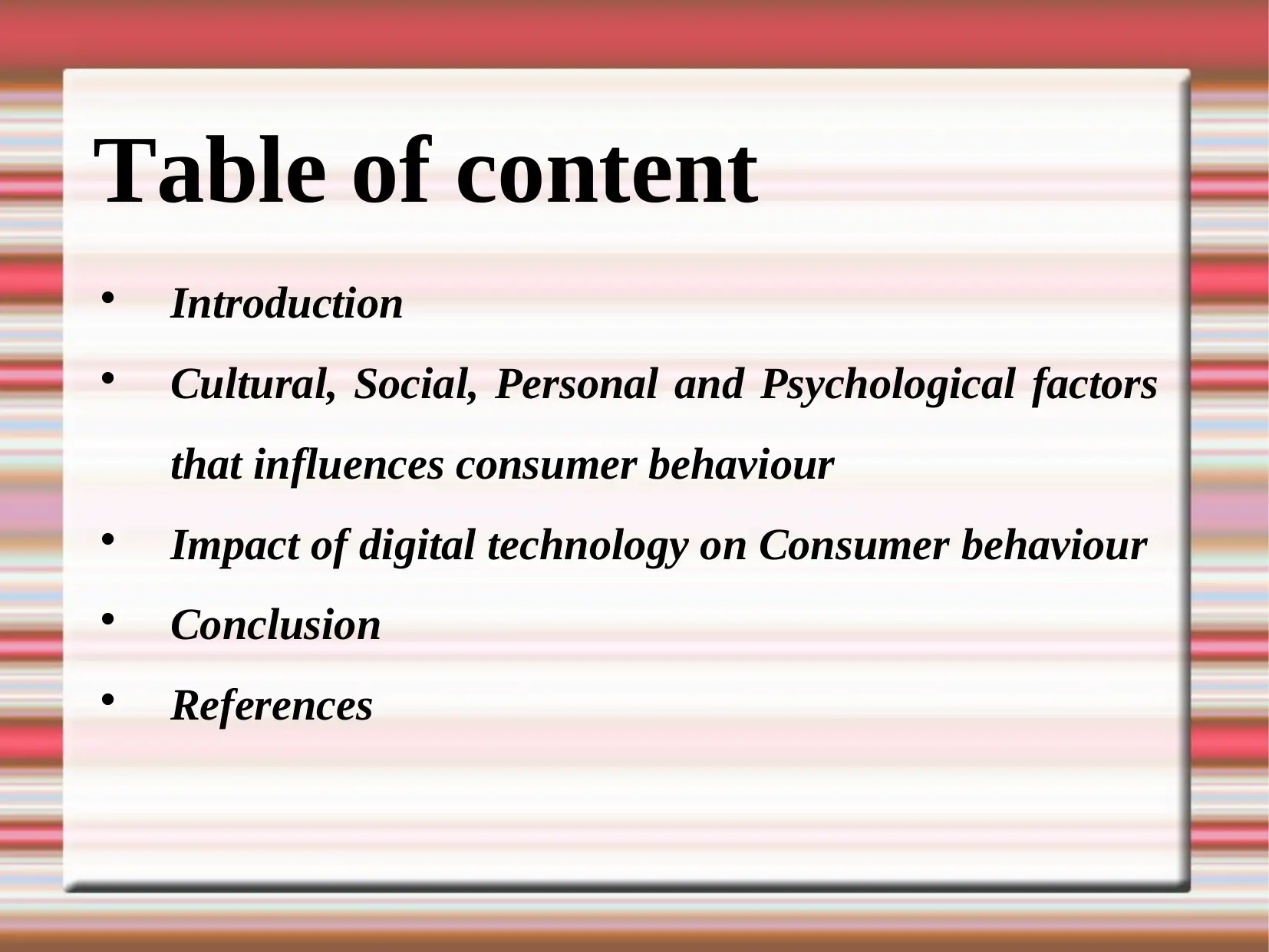
Table of content
Introduction
Cultural, Social, Personal and Psychological factors
that influences consumer behaviour
Impact of digital technology on Consumer behaviour
Conclusion
References
Introduction
Cultural, Social, Personal and Psychological factors
that influences consumer behaviour
Impact of digital technology on Consumer behaviour
Conclusion
References
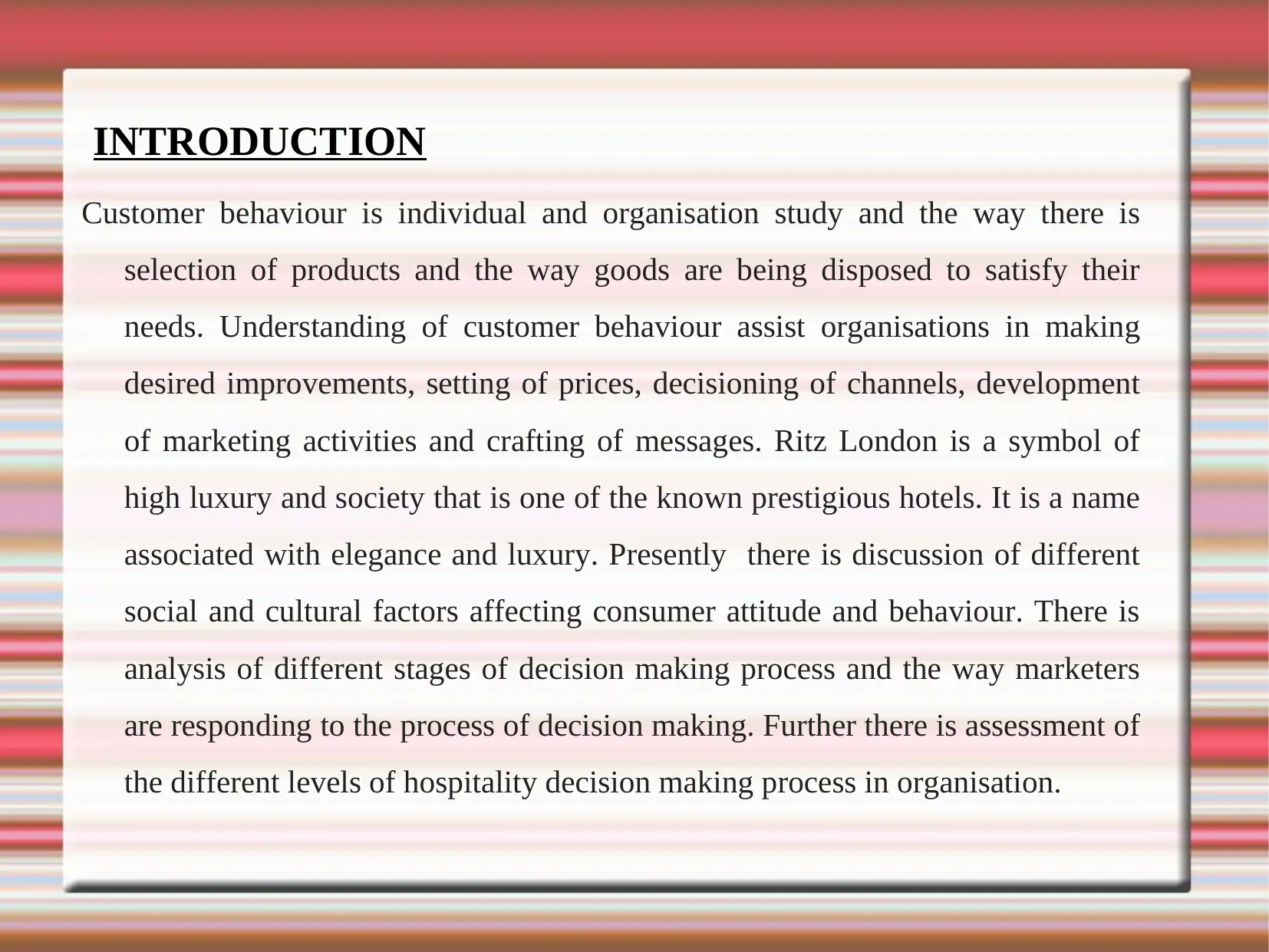
INTRODUCTION
Customer behaviour is individual and organisation study and the way there is
selection of products and the way goods are being disposed to satisfy their
needs. Understanding of customer behaviour assist organisations in making
desired improvements, setting of prices, decisioning of channels, development
of marketing activities and crafting of messages. Ritz London is a symbol of
high luxury and society that is one of the known prestigious hotels. It is a name
associated with elegance and luxury. Presently there is discussion of different
social and cultural factors affecting consumer attitude and behaviour. There is
analysis of different stages of decision making process and the way marketers
are responding to the process of decision making. Further there is assessment of
the different levels of hospitality decision making process in organisation.
Customer behaviour is individual and organisation study and the way there is
selection of products and the way goods are being disposed to satisfy their
needs. Understanding of customer behaviour assist organisations in making
desired improvements, setting of prices, decisioning of channels, development
of marketing activities and crafting of messages. Ritz London is a symbol of
high luxury and society that is one of the known prestigious hotels. It is a name
associated with elegance and luxury. Presently there is discussion of different
social and cultural factors affecting consumer attitude and behaviour. There is
analysis of different stages of decision making process and the way marketers
are responding to the process of decision making. Further there is assessment of
the different levels of hospitality decision making process in organisation.
⊘ This is a preview!⊘
Do you want full access?
Subscribe today to unlock all pages.

Trusted by 1+ million students worldwide
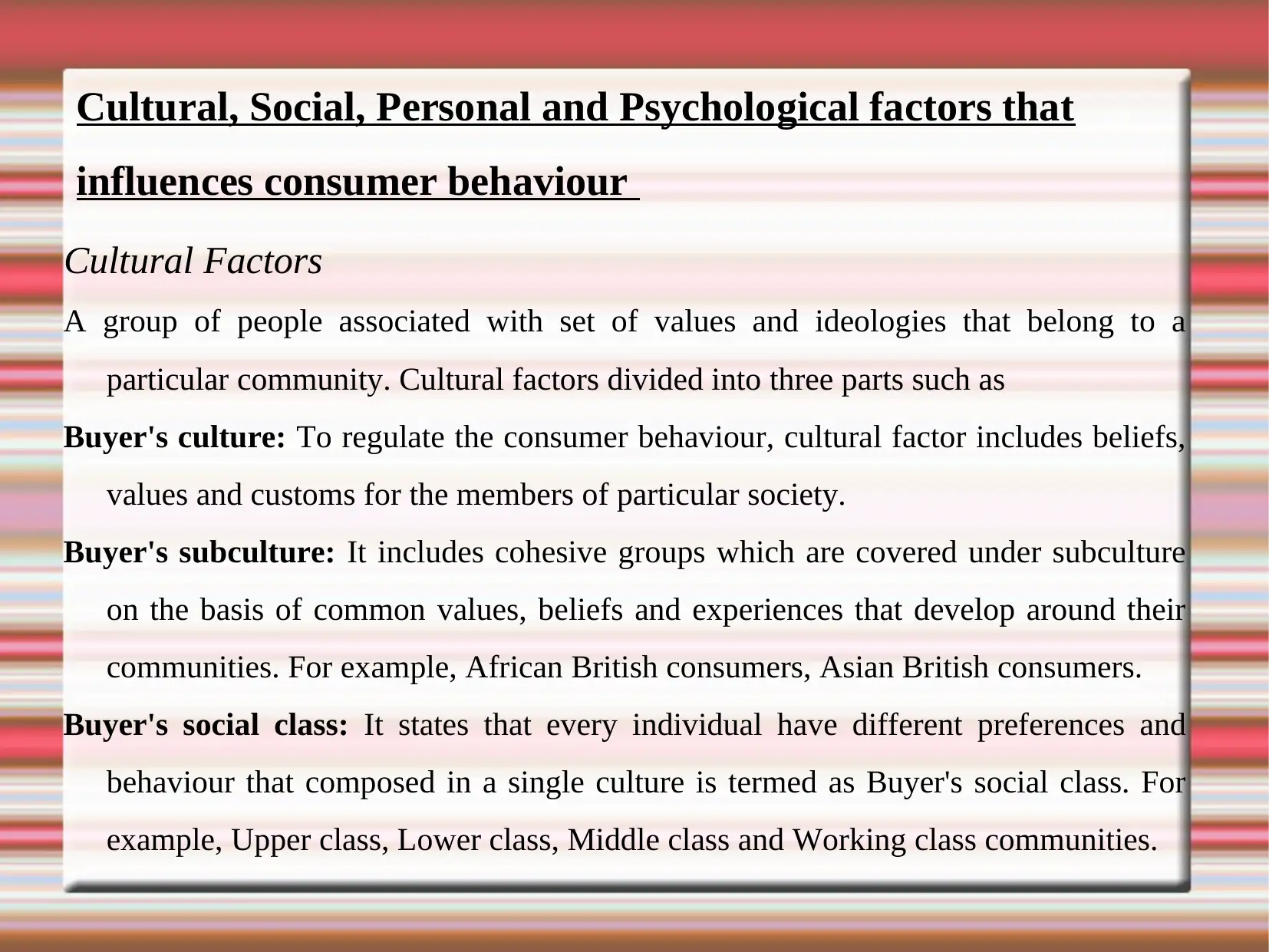
Cultural, Social, Personal and Psychological factors that
influences consumer behaviour
Cultural Factors
A group of people associated with set of values and ideologies that belong to a
particular community. Cultural factors divided into three parts such as
Buyer's culture: To regulate the consumer behaviour, cultural factor includes beliefs,
values and customs for the members of particular society.
Buyer's subculture: It includes cohesive groups which are covered under subculture
on the basis of common values, beliefs and experiences that develop around their
communities. For example, African British consumers, Asian British consumers.
Buyer's social class: It states that every individual have different preferences and
behaviour that composed in a single culture is termed as Buyer's social class. For
example, Upper class, Lower class, Middle class and Working class communities.
influences consumer behaviour
Cultural Factors
A group of people associated with set of values and ideologies that belong to a
particular community. Cultural factors divided into three parts such as
Buyer's culture: To regulate the consumer behaviour, cultural factor includes beliefs,
values and customs for the members of particular society.
Buyer's subculture: It includes cohesive groups which are covered under subculture
on the basis of common values, beliefs and experiences that develop around their
communities. For example, African British consumers, Asian British consumers.
Buyer's social class: It states that every individual have different preferences and
behaviour that composed in a single culture is termed as Buyer's social class. For
example, Upper class, Lower class, Middle class and Working class communities.
Paraphrase This Document
Need a fresh take? Get an instant paraphrase of this document with our AI Paraphraser
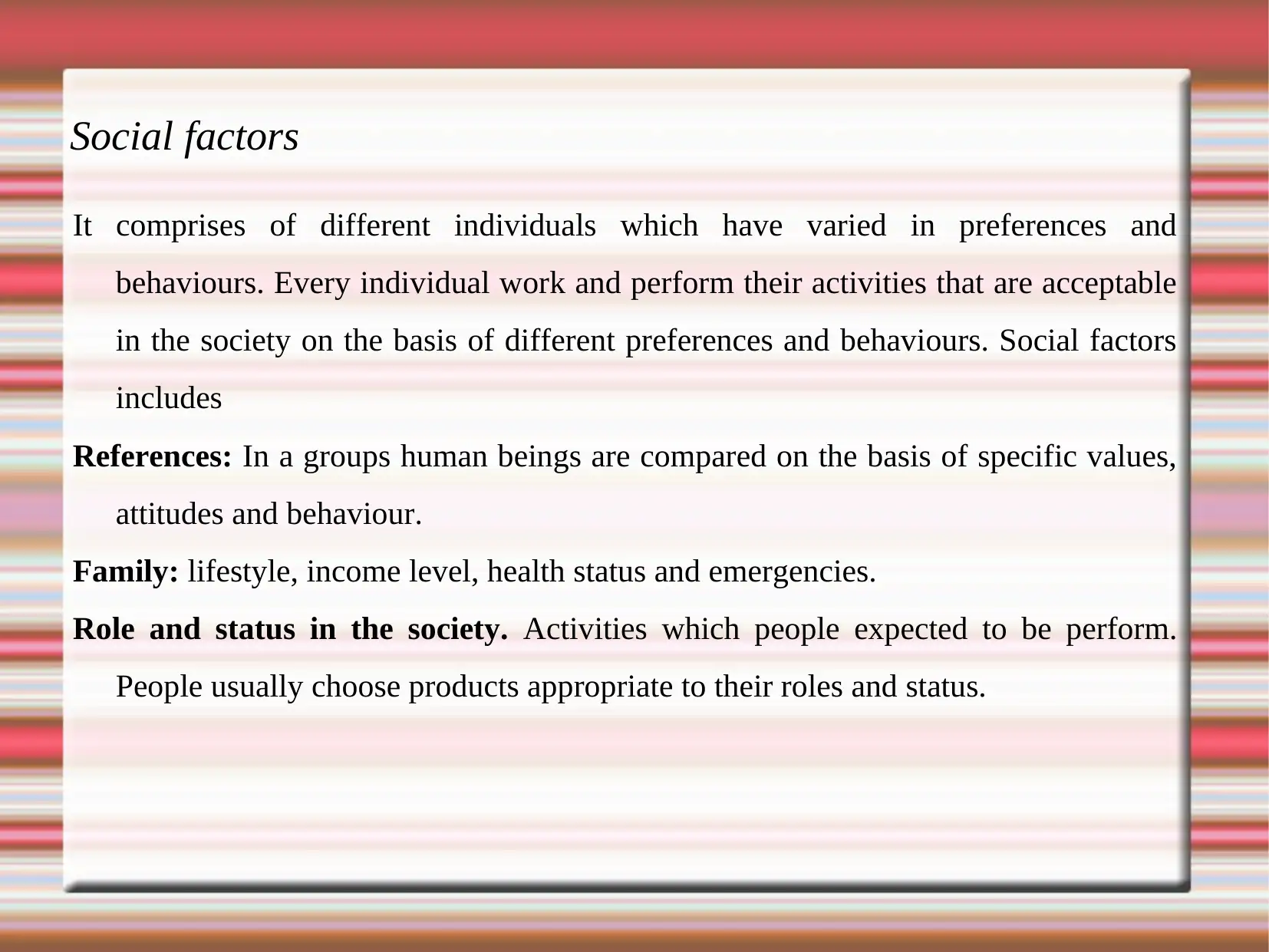
Social factors
It comprises of different individuals which have varied in preferences and
behaviours. Every individual work and perform their activities that are acceptable
in the society on the basis of different preferences and behaviours. Social factors
includes
References: In a groups human beings are compared on the basis of specific values,
attitudes and behaviour.
Family: lifestyle, income level, health status and emergencies.
Role and status in the society. Activities which people expected to be perform.
People usually choose products appropriate to their roles and status.
It comprises of different individuals which have varied in preferences and
behaviours. Every individual work and perform their activities that are acceptable
in the society on the basis of different preferences and behaviours. Social factors
includes
References: In a groups human beings are compared on the basis of specific values,
attitudes and behaviour.
Family: lifestyle, income level, health status and emergencies.
Role and status in the society. Activities which people expected to be perform.
People usually choose products appropriate to their roles and status.
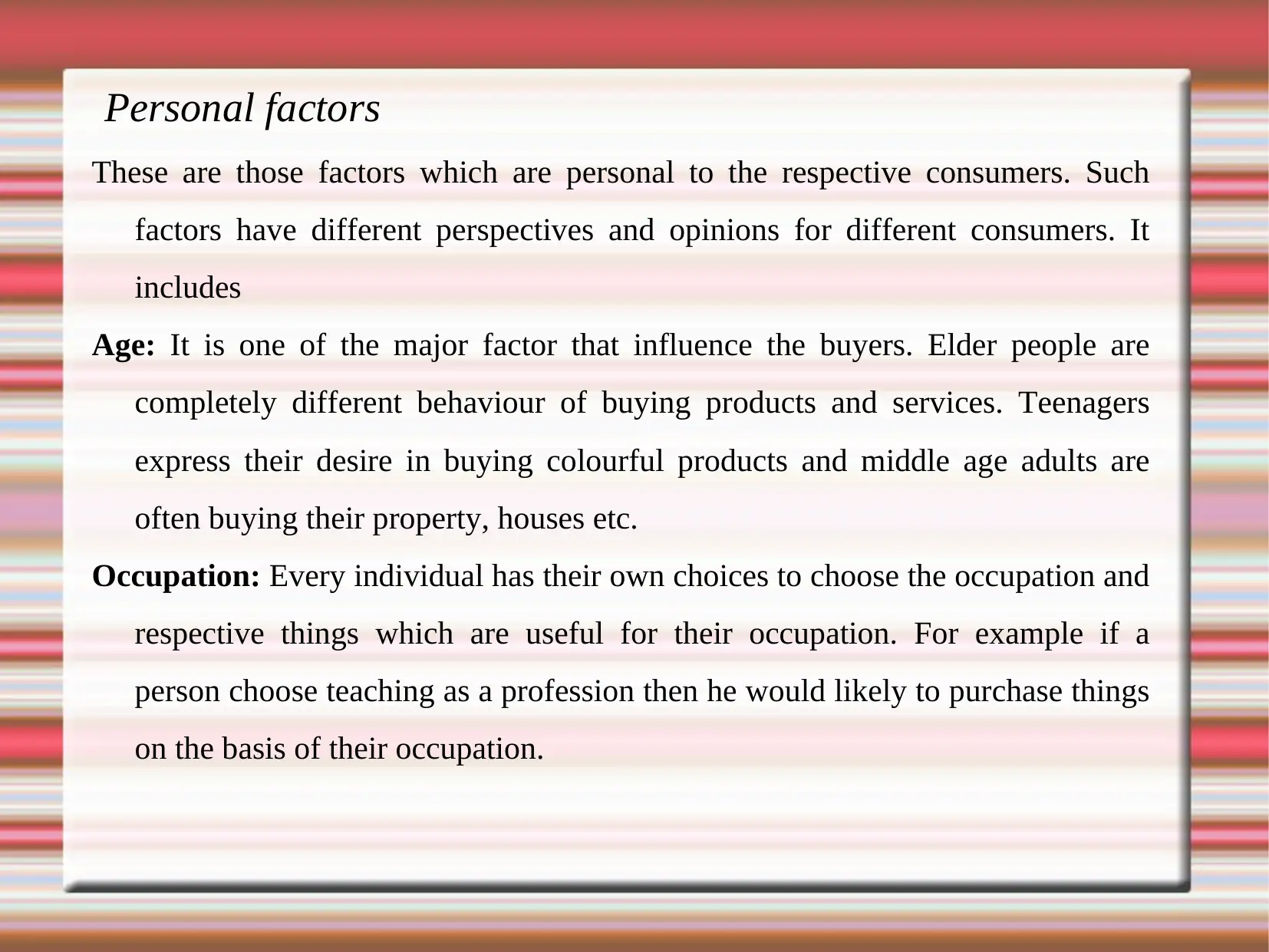
Personal factors
These are those factors which are personal to the respective consumers. Such
factors have different perspectives and opinions for different consumers. It
includes
Age: It is one of the major factor that influence the buyers. Elder people are
completely different behaviour of buying products and services. Teenagers
express their desire in buying colourful products and middle age adults are
often buying their property, houses etc.
Occupation: Every individual has their own choices to choose the occupation and
respective things which are useful for their occupation. For example if a
person choose teaching as a profession then he would likely to purchase things
on the basis of their occupation.
These are those factors which are personal to the respective consumers. Such
factors have different perspectives and opinions for different consumers. It
includes
Age: It is one of the major factor that influence the buyers. Elder people are
completely different behaviour of buying products and services. Teenagers
express their desire in buying colourful products and middle age adults are
often buying their property, houses etc.
Occupation: Every individual has their own choices to choose the occupation and
respective things which are useful for their occupation. For example if a
person choose teaching as a profession then he would likely to purchase things
on the basis of their occupation.
⊘ This is a preview!⊘
Do you want full access?
Subscribe today to unlock all pages.

Trusted by 1+ million students worldwide
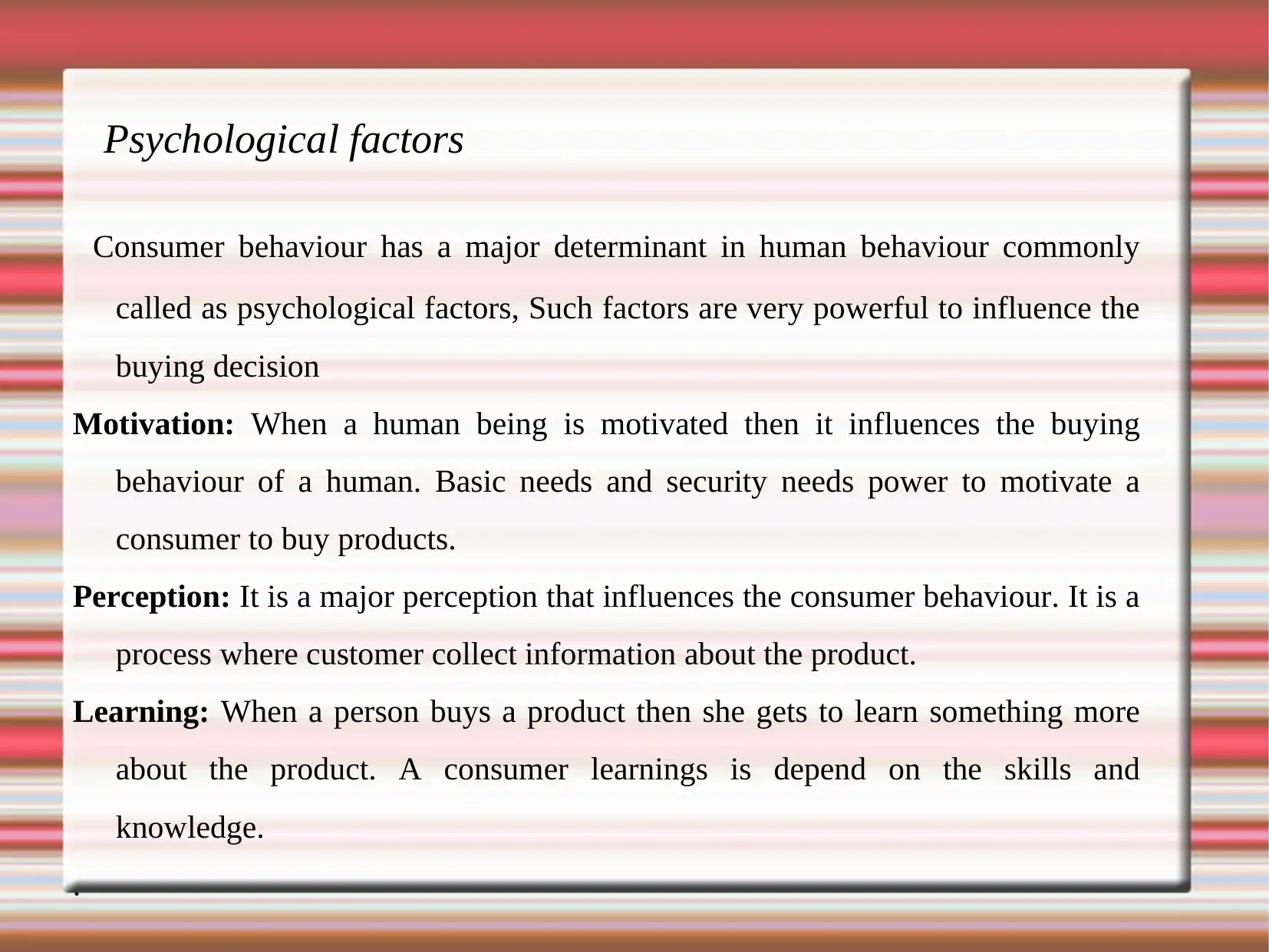
Psychological factors
Consumer behaviour has a major determinant in human behaviour commonly
called as psychological factors, Such factors are very powerful to influence the
buying decision
Motivation: When a human being is motivated then it influences the buying
behaviour of a human. Basic needs and security needs power to motivate a
consumer to buy products.
Perception: It is a major perception that influences the consumer behaviour. It is a
process where customer collect information about the product.
Learning: When a person buys a product then she gets to learn something more
about the product. A consumer learnings is depend on the skills and
knowledge.
.
Consumer behaviour has a major determinant in human behaviour commonly
called as psychological factors, Such factors are very powerful to influence the
buying decision
Motivation: When a human being is motivated then it influences the buying
behaviour of a human. Basic needs and security needs power to motivate a
consumer to buy products.
Perception: It is a major perception that influences the consumer behaviour. It is a
process where customer collect information about the product.
Learning: When a person buys a product then she gets to learn something more
about the product. A consumer learnings is depend on the skills and
knowledge.
.
Paraphrase This Document
Need a fresh take? Get an instant paraphrase of this document with our AI Paraphraser
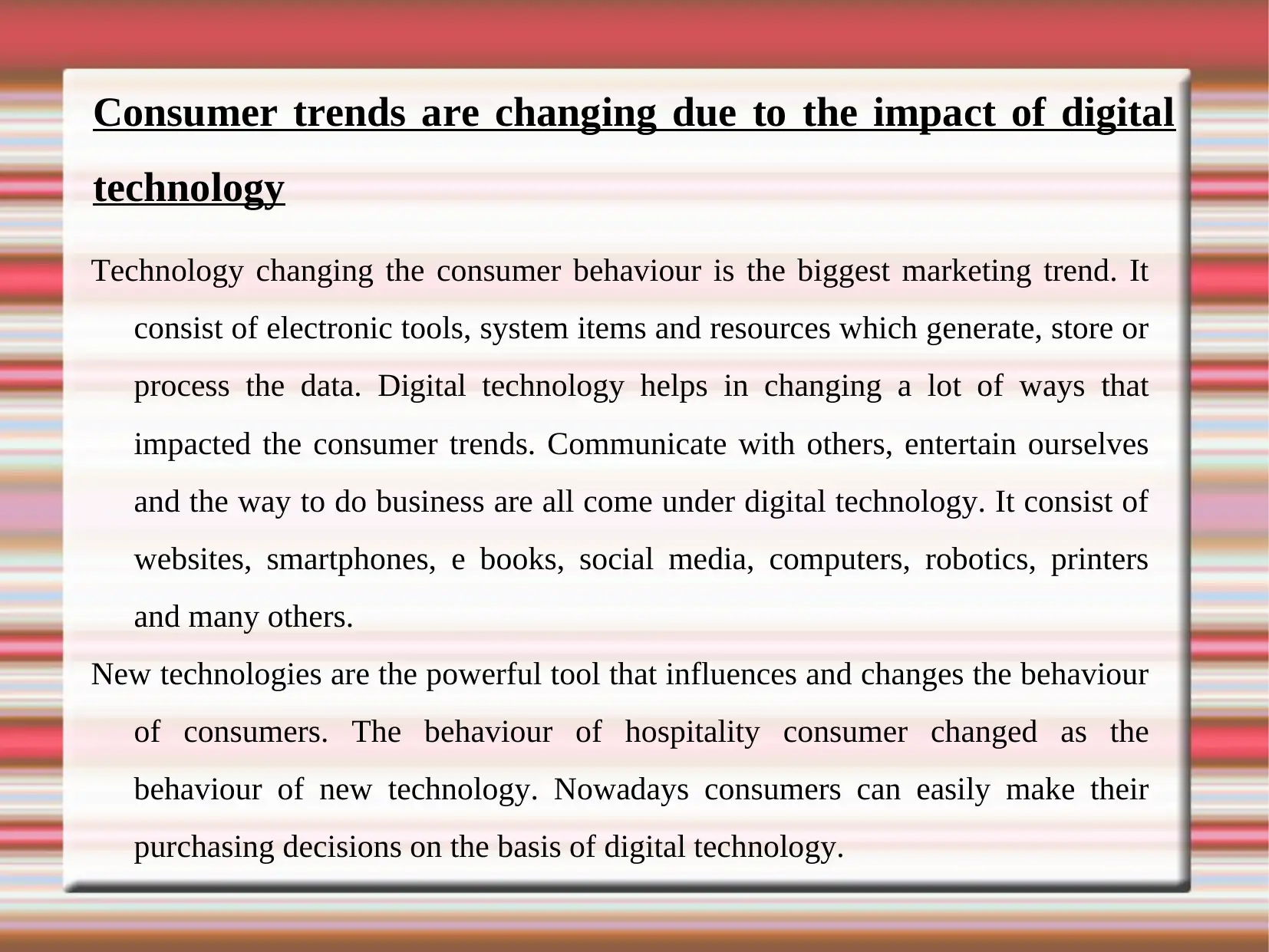
Consumer trends are changing due to the impact of digital
technology
Technology changing the consumer behaviour is the biggest marketing trend. It
consist of electronic tools, system items and resources which generate, store or
process the data. Digital technology helps in changing a lot of ways that
impacted the consumer trends. Communicate with others, entertain ourselves
and the way to do business are all come under digital technology. It consist of
websites, smartphones, e books, social media, computers, robotics, printers
and many others.
New technologies are the powerful tool that influences and changes the behaviour
of consumers. The behaviour of hospitality consumer changed as the
behaviour of new technology. Nowadays consumers can easily make their
purchasing decisions on the basis of digital technology.
technology
Technology changing the consumer behaviour is the biggest marketing trend. It
consist of electronic tools, system items and resources which generate, store or
process the data. Digital technology helps in changing a lot of ways that
impacted the consumer trends. Communicate with others, entertain ourselves
and the way to do business are all come under digital technology. It consist of
websites, smartphones, e books, social media, computers, robotics, printers
and many others.
New technologies are the powerful tool that influences and changes the behaviour
of consumers. The behaviour of hospitality consumer changed as the
behaviour of new technology. Nowadays consumers can easily make their
purchasing decisions on the basis of digital technology.
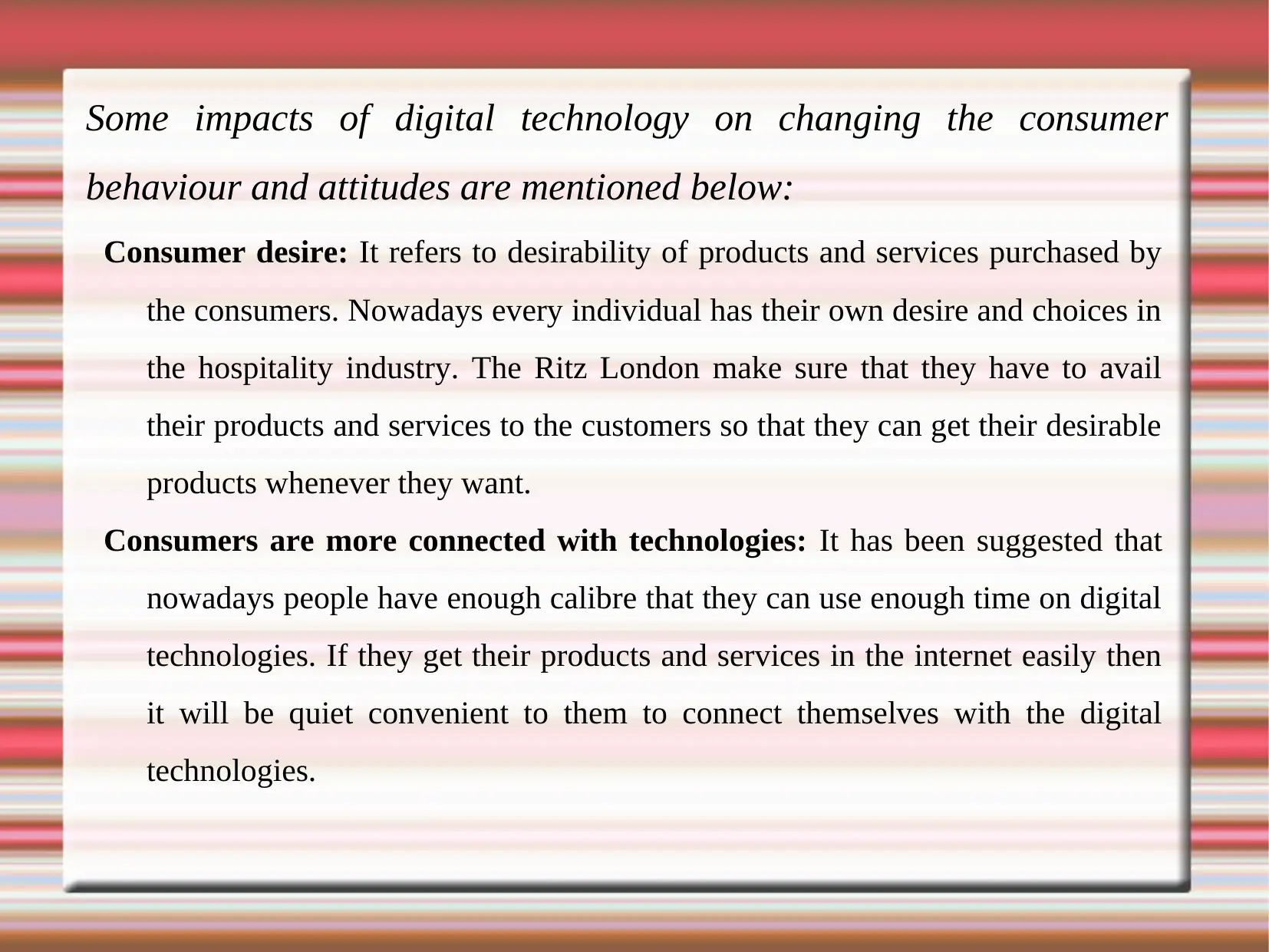
Some impacts of digital technology on changing the consumer
behaviour and attitudes are mentioned below:
Consumer desire: It refers to desirability of products and services purchased by
the consumers. Nowadays every individual has their own desire and choices in
the hospitality industry. The Ritz London make sure that they have to avail
their products and services to the customers so that they can get their desirable
products whenever they want.
Consumers are more connected with technologies: It has been suggested that
nowadays people have enough calibre that they can use enough time on digital
technologies. If they get their products and services in the internet easily then
it will be quiet convenient to them to connect themselves with the digital
technologies.
behaviour and attitudes are mentioned below:
Consumer desire: It refers to desirability of products and services purchased by
the consumers. Nowadays every individual has their own desire and choices in
the hospitality industry. The Ritz London make sure that they have to avail
their products and services to the customers so that they can get their desirable
products whenever they want.
Consumers are more connected with technologies: It has been suggested that
nowadays people have enough calibre that they can use enough time on digital
technologies. If they get their products and services in the internet easily then
it will be quiet convenient to them to connect themselves with the digital
technologies.
⊘ This is a preview!⊘
Do you want full access?
Subscribe today to unlock all pages.

Trusted by 1+ million students worldwide
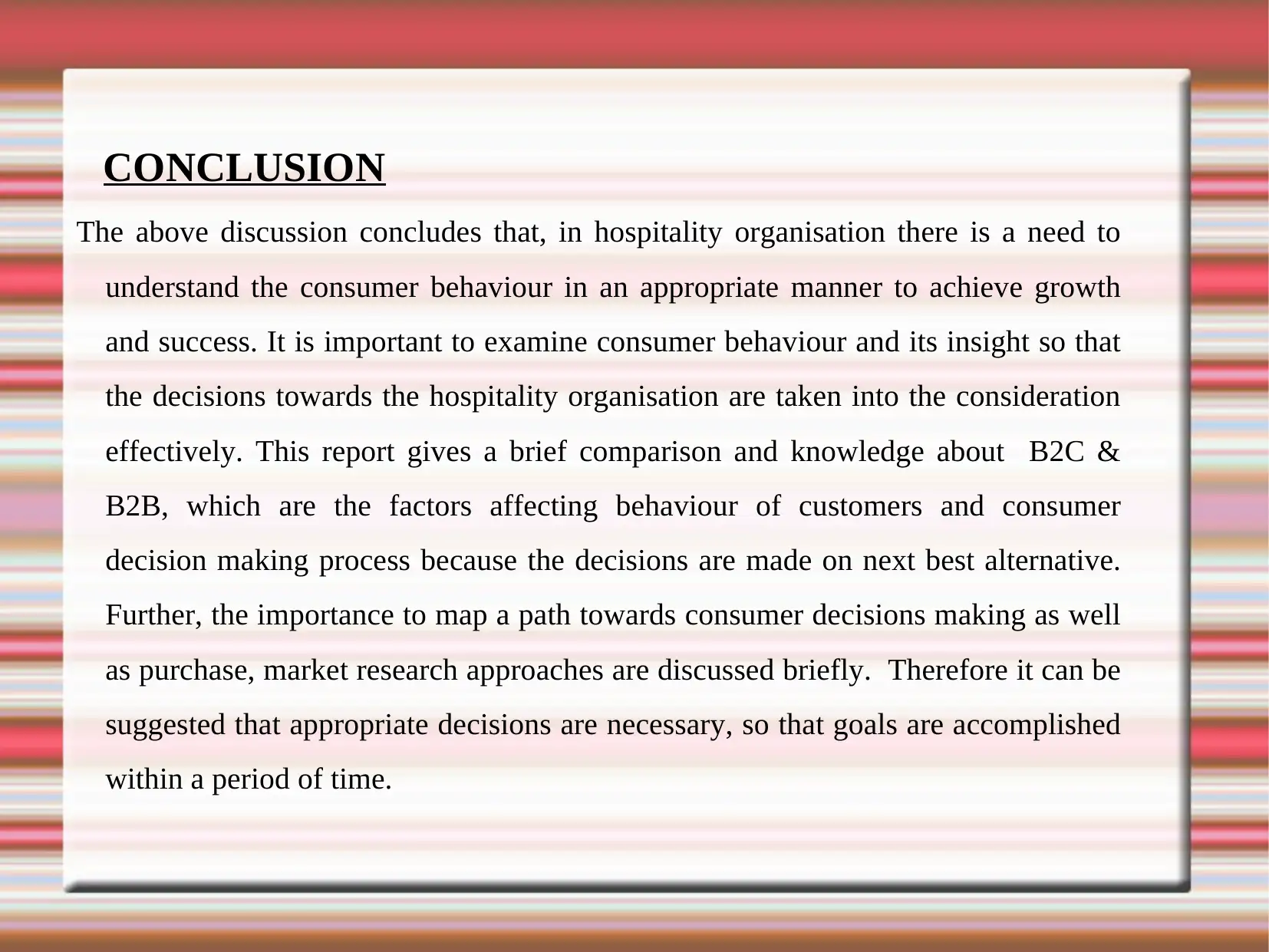
CONCLUSION
The above discussion concludes that, in hospitality organisation there is a need to
understand the consumer behaviour in an appropriate manner to achieve growth
and success. It is important to examine consumer behaviour and its insight so that
the decisions towards the hospitality organisation are taken into the consideration
effectively. This report gives a brief comparison and knowledge about B2C &
B2B, which are the factors affecting behaviour of customers and consumer
decision making process because the decisions are made on next best alternative.
Further, the importance to map a path towards consumer decisions making as well
as purchase, market research approaches are discussed briefly. Therefore it can be
suggested that appropriate decisions are necessary, so that goals are accomplished
within a period of time.
The above discussion concludes that, in hospitality organisation there is a need to
understand the consumer behaviour in an appropriate manner to achieve growth
and success. It is important to examine consumer behaviour and its insight so that
the decisions towards the hospitality organisation are taken into the consideration
effectively. This report gives a brief comparison and knowledge about B2C &
B2B, which are the factors affecting behaviour of customers and consumer
decision making process because the decisions are made on next best alternative.
Further, the importance to map a path towards consumer decisions making as well
as purchase, market research approaches are discussed briefly. Therefore it can be
suggested that appropriate decisions are necessary, so that goals are accomplished
within a period of time.
Paraphrase This Document
Need a fresh take? Get an instant paraphrase of this document with our AI Paraphraser
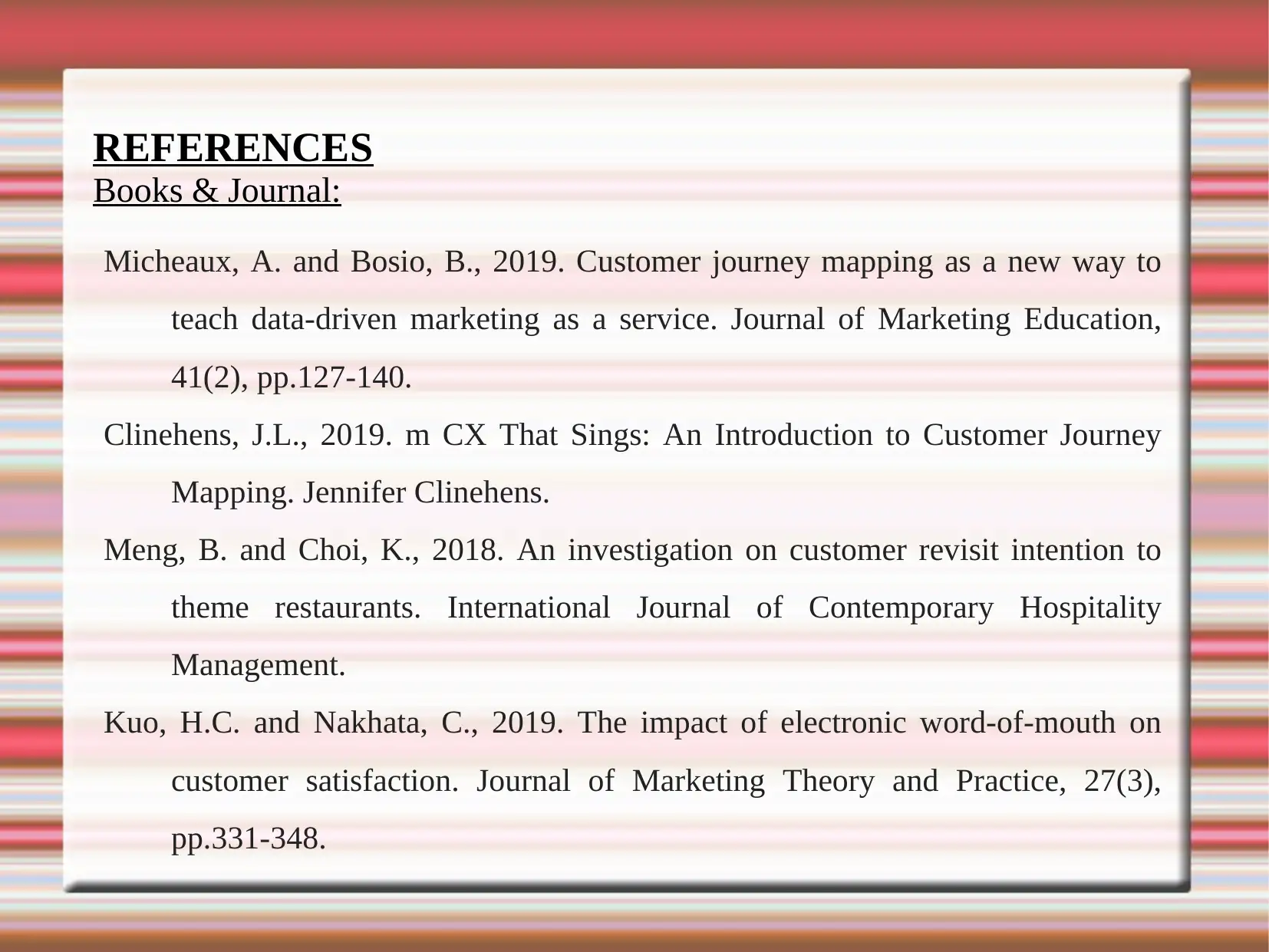
REFERENCES
Books & Journal:
Micheaux, A. and Bosio, B., 2019. Customer journey mapping as a new way to
teach data-driven marketing as a service. Journal of Marketing Education,
41(2), pp.127-140.
Clinehens, J.L., 2019. m CX That Sings: An Introduction to Customer Journey
Mapping. Jennifer Clinehens.
Meng, B. and Choi, K., 2018. An investigation on customer revisit intention to
theme restaurants. International Journal of Contemporary Hospitality
Management.
Kuo, H.C. and Nakhata, C., 2019. The impact of electronic word-of-mouth on
customer satisfaction. Journal of Marketing Theory and Practice, 27(3),
pp.331-348.
Books & Journal:
Micheaux, A. and Bosio, B., 2019. Customer journey mapping as a new way to
teach data-driven marketing as a service. Journal of Marketing Education,
41(2), pp.127-140.
Clinehens, J.L., 2019. m CX That Sings: An Introduction to Customer Journey
Mapping. Jennifer Clinehens.
Meng, B. and Choi, K., 2018. An investigation on customer revisit intention to
theme restaurants. International Journal of Contemporary Hospitality
Management.
Kuo, H.C. and Nakhata, C., 2019. The impact of electronic word-of-mouth on
customer satisfaction. Journal of Marketing Theory and Practice, 27(3),
pp.331-348.
1 out of 11
Related Documents
Your All-in-One AI-Powered Toolkit for Academic Success.
+13062052269
info@desklib.com
Available 24*7 on WhatsApp / Email
![[object Object]](/_next/static/media/star-bottom.7253800d.svg)
Unlock your academic potential
Copyright © 2020–2026 A2Z Services. All Rights Reserved. Developed and managed by ZUCOL.



